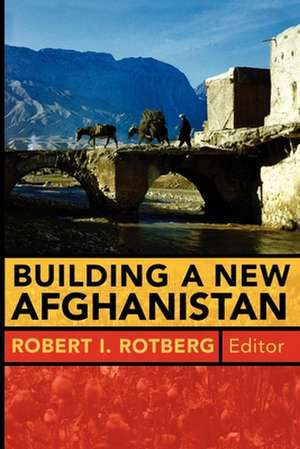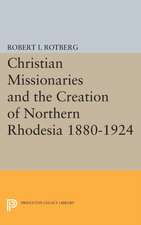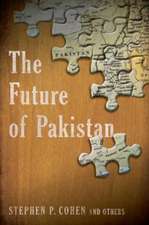Building a New Afghanistan
Editat de Robert I. Rotbergen Limba Engleză Paperback – 27 feb 2007
In the wake of the Taliban nightmare, Afghanistan must tackle serious problems before it can emerge as a confident, independent nation. Security in this battered state continues to deteriorate; suicide bombings, convoy ambushes, and insurgent attacks are all too common. Effective state building will depend upon eliminating the national security crisis and enhancing the rule of law. This book offers a blueprint for moving the embattled nation toward greater democracy and prosperity. Robert Rotberg and his colleagues argue that the future success of state building in Afghanistan depends on lessening its dependence on opium and enhancing its economic status. Many of Afghanistan's security problems are related to poppy growing, opium and heroin production, and drug trafficking. Building a New Afghanistan suggests controversial new alternatives to immediate eradication, which is foolish and counter-productive. These options include monetary incentives for growing wheat, a viable local crop. Greater wheat production would feed hungry Afghans while reducing narco-trafficking and the terror that comes with it. Integrating this land-locked country into the Central Asia or greater Eurasia economy would open up trading partnerships with its northern and western neighbors as well as with Pakistan, India, and possibly China. Developing a sense of common purpose among citizens would benefit the economy and could help to unite the nation. Perhaps most important, bolstering better governance in Afghanistan is necessary in order to eliminate chaos and corruption and enact nationwide reforms. Fresh and insightful, Building a New Afghanistan shows what the country's leadership and the international community should do to resolve dangerous issues and bolster a still fragile state. Contributors include Cindy Fazey (University of Liverpool), Ali Jalali (former minister of the interior, Afghanistan, and National Defense University), Hekmat Karzai (Centre for Conflict and Peace Studies, Afghanistan, and Institute of Defense and Strategic Studies, Singapore), Alistair J. McKechnie (World Bank Country Director for Afghanistan), Paula Newburg (Skidmore College), and S. Frederick Starr (Central Asia-Caucasus Institute and School of Advanced International Studies, Johns Hopkins University).
Preț: 214.03 lei
Nou
Puncte Express: 321
Preț estimativ în valută:
40.96€ • 42.50$ • 34.23£
40.96€ • 42.50$ • 34.23£
Carte tipărită la comandă
Livrare economică 15-29 martie
Preluare comenzi: 021 569.72.76
Specificații
ISBN-13: 9780815775690
ISBN-10: 0815775695
Pagini: 242
Ilustrații: 1 map
Dimensiuni: 152 x 229 x 17 mm
Greutate: 0.35 kg
Editura: Brookings Institution Press
Colecția Brookings Inst. Press/World Peace Fdn.
ISBN-10: 0815775695
Pagini: 242
Ilustrații: 1 map
Dimensiuni: 152 x 229 x 17 mm
Greutate: 0.35 kg
Editura: Brookings Institution Press
Colecția Brookings Inst. Press/World Peace Fdn.
Notă biografică
Robert I. Rotberg is director of the Program on Intrastate Conflict, Conflict Prevention, and Conflict Resolution at Harvard University's John F. Kennedy School of Government, and president of the World Peace Foundation. Rotberg is the author or editor of numerous books, including State Failure and State Weakness in a Time of Terror (Brookings/WPF, 2003).
Descriere
A Brookings Institution Press and World Peace Foundation publication
In the wake of the Taliban nightmare, Afghanistan must tackle serious problems before it can emerge as a confident, independent nation. Security in this battered state continues to deteriorate; suicide bombings, convoy ambushes, and insurgent attacks are all too common. Effective state building will depend upon eliminating the national security crisis and enhancing the rule of law. This book offers a blueprint for moving the embattled nation toward greater democracy and prosperity.
Robert Rotberg and his colleagues argue that the future success of state building in Afghanistan depends on lessening its dependence on opium and enhancing its economic status. Many of Afghanistan's security problems are related to poppy growing, opium and heroin production, and drug trafficking. Building a New Afghanistan suggests controversial new alternatives to immediate eradication, which is foolish and counter-productive. These options include monetary incentives for growing wheat, a viable local crop. Greater wheat production would feed hungry Afghans while reducing narco-trafficking and the terror that comes with it. Integrating this land-locked country into the Central Asia or greater Eurasia economy would open up trading partnerships with its northern and western neighbors as well as with Pakistan, India, and possibly China. Developing a sense of common purpose among citizens would benefit the economy and could help to unite the nation. Perhaps most important, bolstering better governance in Afghanistan is necessary in order to eliminate chaos and corruption and enact nationwide reforms.
Fresh and insightful, Building a New Afghanistan shows what the country's leadership and the international community should do to resolve dangerous issues and bolster a still fragile state.
Contributors include Cindy Fazey (University of Liverpool), Ali Jalali (former minister of the interior, Afghanistan, and National Defense University), Hekmat Karzai (Centre for Conflict and Peace
In the wake of the Taliban nightmare, Afghanistan must tackle serious problems before it can emerge as a confident, independent nation. Security in this battered state continues to deteriorate; suicide bombings, convoy ambushes, and insurgent attacks are all too common. Effective state building will depend upon eliminating the national security crisis and enhancing the rule of law. This book offers a blueprint for moving the embattled nation toward greater democracy and prosperity.
Robert Rotberg and his colleagues argue that the future success of state building in Afghanistan depends on lessening its dependence on opium and enhancing its economic status. Many of Afghanistan's security problems are related to poppy growing, opium and heroin production, and drug trafficking. Building a New Afghanistan suggests controversial new alternatives to immediate eradication, which is foolish and counter-productive. These options include monetary incentives for growing wheat, a viable local crop. Greater wheat production would feed hungry Afghans while reducing narco-trafficking and the terror that comes with it. Integrating this land-locked country into the Central Asia or greater Eurasia economy would open up trading partnerships with its northern and western neighbors as well as with Pakistan, India, and possibly China. Developing a sense of common purpose among citizens would benefit the economy and could help to unite the nation. Perhaps most important, bolstering better governance in Afghanistan is necessary in order to eliminate chaos and corruption and enact nationwide reforms.
Fresh and insightful, Building a New Afghanistan shows what the country's leadership and the international community should do to resolve dangerous issues and bolster a still fragile state.
Contributors include Cindy Fazey (University of Liverpool), Ali Jalali (former minister of the interior, Afghanistan, and National Defense University), Hekmat Karzai (Centre for Conflict and Peace













